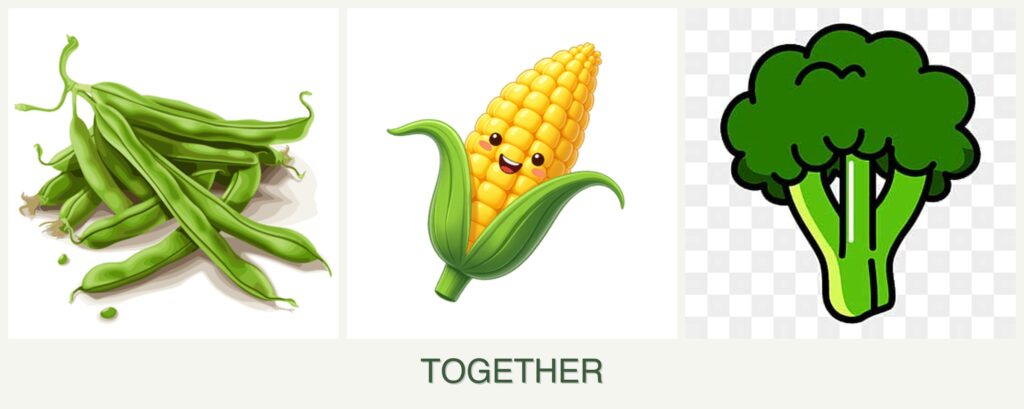
Can you plant beans, corn and broccoli together?
Can You Plant Beans, Corn, and Broccoli Together?
Companion planting is a popular gardening technique that involves growing different plants together to enhance growth, deter pests, and optimize garden space. Many gardeners wonder if beans, corn, and broccoli can be planted together. This article will explore their compatibility, benefits, challenges, and best practices for successful planting.
Compatibility Analysis
Can you plant beans, corn, and broccoli together? Yes, you can plant beans and corn together, but broccoli may not be the best companion for this trio. Beans and corn are classic companions in the "Three Sisters" planting method, where beans climb the corn stalks and fix nitrogen in the soil, benefiting both plants. However, broccoli, a heavy feeder, competes for nutrients and space, potentially stunting the growth of beans and corn.
Key Factors
- Growth Requirements: Beans and corn thrive in similar conditions, while broccoli prefers cooler temperatures.
- Pest Control: Beans can deter certain pests from corn, but broccoli attracts different insects that may not benefit the trio.
- Nutrient Needs: Beans enrich the soil with nitrogen, aiding corn, but broccoli’s nutrient demands can deplete resources.
- Spacing: Corn provides a natural trellis for beans, but broccoli’s spread can crowd other plants.
Growing Requirements Comparison Table
| Plant | Sunlight Needs | Water Requirements | Soil pH | Soil Type | Hardiness Zones | Spacing Requirements | Growth Habit |
|---|---|---|---|---|---|---|---|
| Beans | Full sun | Moderate | 6.0-7.5 | Well-drained | 3-10 | 4-6 inches apart | Climbing |
| Corn | Full sun | Moderate | 5.8-6.8 | Well-drained | 3-11 | 12-18 inches apart | Tall stalks |
| Broccoli | Full sun | Moderate | 6.0-7.0 | Rich, loamy | 3-10 | 18-24 inches apart | Upright |
Benefits of Planting Together
- Pest Repellent Properties: Beans can deter corn pests like corn earworms.
- Improved Growth: Beans fix nitrogen, benefiting corn.
- Space Efficiency: Beans use corn as support, saving space.
- Soil Health: Nitrogen fixation by beans improves soil fertility.
- Pollinator Attraction: Corn’s tall stalks and beans’ flowers attract beneficial insects.
Potential Challenges
- Resource Competition: Broccoli’s heavy nutrient needs can hinder corn and beans.
- Watering Needs: While all need moderate water, timing and amounts may differ.
- Disease Susceptibility: Broccoli may introduce pests and diseases not common to beans and corn.
- Harvesting: Differing harvest times can complicate garden management.
Practical Solutions
- Separate Broccoli: Consider planting broccoli in a different bed or container.
- Adjust Spacing: Ensure adequate space for each plant’s growth needs.
- Monitor Watering: Adapt watering schedules to suit all plants.
Planting Tips & Best Practices
- Optimal Spacing: Plant corn in blocks for pollination, with beans interspersed. Keep broccoli in separate rows.
- Timing: Plant corn and beans after the last frost; broccoli can be started earlier.
- Container vs. Garden Bed: Use containers for broccoli to manage its nutrient needs separately.
- Soil Preparation: Enrich soil with compost, especially for broccoli.
- Additional Companions: Consider adding marigolds for pest control and basil for flavor enhancement.
FAQ Section
Can you plant beans and corn in the same pot?
No, they require more space than a pot can provide.
How far apart should beans and corn be planted?
Beans should be planted 4-6 inches apart, corn 12-18 inches apart.
Do beans and corn need the same amount of water?
Yes, both require moderate watering.
What should not be planted with broccoli?
Avoid planting broccoli with tomatoes and strawberries, which compete for nutrients.
Will beans affect the taste of corn?
No, beans do not affect the taste of corn.
When is the best time to plant beans, corn, and broccoli together?
Plant beans and corn after the last frost; start broccoli earlier in cooler temperatures.
By understanding the compatibility and requirements of beans, corn, and broccoli, gardeners can make informed decisions to optimize their vegetable garden for productivity and health.



Leave a Reply